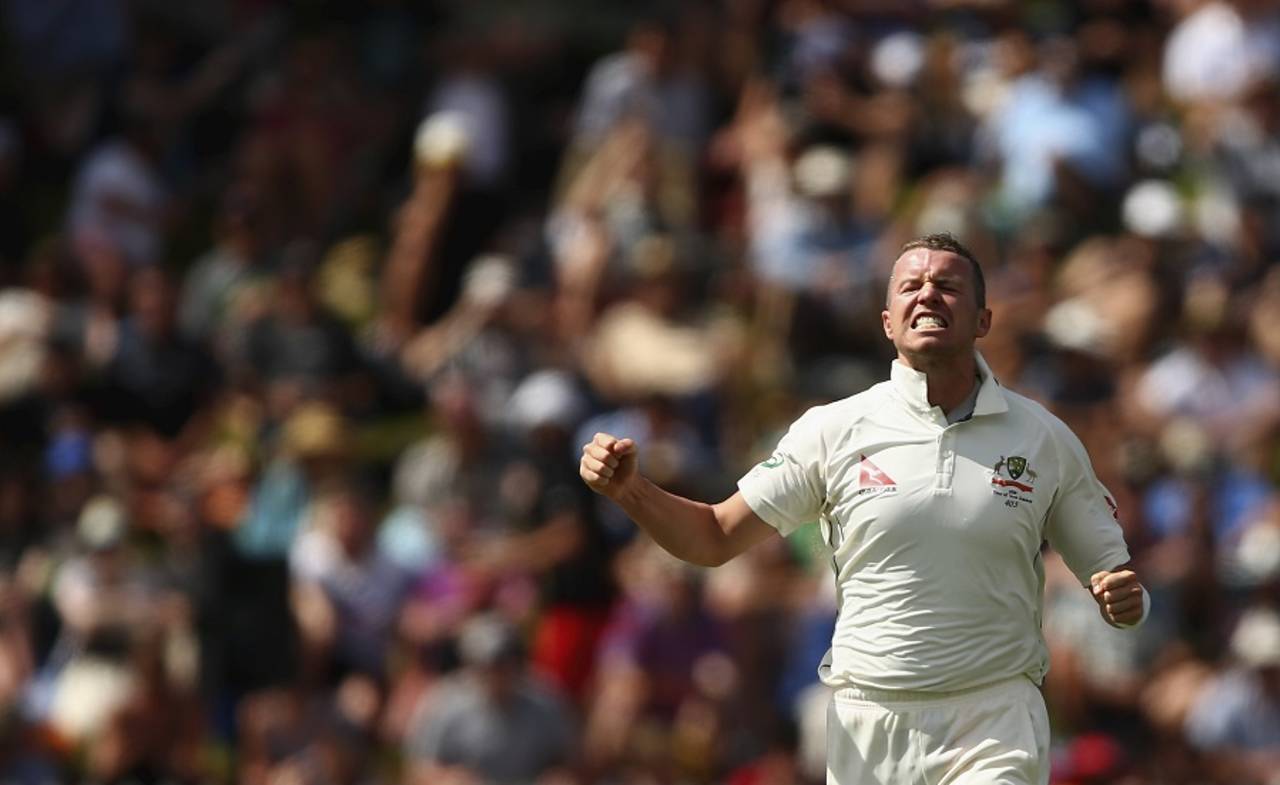Australia's system is broken
Injured fast bowlers, a dearth of good young batsmen, and a captain impeded by the management - all this while the team faces three big series
Ian Chappell
12-Nov-2016

Peter Siddle returned to international cricket in the Perth Test after being sidelined in February this year but was ruled out from the next Test due to a back injury • Getty Images
While Australia capitulated at the WACA and then collapsed at Bellerive, both India and England prospered in Rajkot.
The implications of these scenarios are many and varied. Australia are in distinct trouble against South Africa, and unless this trend is reversed quickly, the selectors face the prospect of wholesale changes for the upcoming series against an improved Pakistan outfit.
Australia then face a tough tour of India, a playground where they have recently experienced more recriminations than celebrations, followed by a visit from England next summer. To say the next few weeks are crucial to Australian cricket is akin to saying the world awaits Donald Trump's presidency with bated breath.
Most of Australia's recent failures have stemmed from poor batting displays, but the inability to keep fast bowlers fit for duty is shaping to be just as big a problem.
A short while ago it appeared Australia's pace bowling future was bright, with Mitchell Starc, James Pattinson and Pat Cummins all capable of swinging the ball at genuine pace, while Josh Hazlewood and Peter Siddle provided consistently probing spells. In addition, there were other hopefuls with pace and talent at the Shield level who promised adequate back-up in case of the odd injury.
I don't think the system allows you to captain Australia properly. There are too many people to tell to get stuffed
Since then there has been a string of injuries as long as the sartorius muscle, which leaves Starc and Hazlewood as the last men standing. It's a bleak picture that provides skipper Steven Smith with a migraine-style headache and the administrators with many questions to answer.
When a team has lost four Tests in succession - three of them from virtually impregnable positions - there are bound to be questions about the captain's right to retain the job. However, the job of the Australian captain has been made increasingly difficult over the years by some questionable administrative decisions.
In 2011, I told the Argus review: "I don't think the system allows you to captain Australia properly. There are too many people to tell to get stuffed. At least when I was skipper, you only had to tell the manager to butt out if he wanted to stick his nose into the cricket side of the business."
With that said, the Argus review recommended an additional layer of management and even more impediment to good captaincy.
Smith's job has been made infinitely harder than mine ever was. At least I was in control of my own destiny, which is a must when all the wins and losses go against your name. Smith doesn't have that luxury and he's also impeded by a development system that is faltering, bordering on total engine failure.
Cricket Australia held the Argus review and another one into the safety of the game following the tragic death of Phil Hughes. However, it hasn't addressed the failure of a system that should provide selectors with a production line of successful young batsmen from first-class cricket. The current system has been an abject failure for at least a decade, mainly providing a string of journeymen and ageing debutants, and yet, nothing seems to change.
Actually, that's not exactly true. There are more coaches, more theories on how to play spin bowling, and fewer overseas successes. While the failures in India, England and Sri Lanka were treated with an "out of sight, out of mind" approach by the public, the inability to cope with a weakened South African attack on a reasonable WACA surface has shone a fierce spotlight on Australia's batting frailty.
India, on the other hand, have a plentiful supply of talented and technically efficient young batsmen. England, who used to eschew selecting youth as though that would inflict a plague on the side, have blooded two young batting hopefuls on the tour of Bangladesh and India.
Australia are now at the point where the ageing-debutant policy is a proven failure and they will be forced to choose a few younger batsmen on a speculative basis.
With a tour of India and a tough home series against England looming, this is not ideal. It could go one of two ways: either it'll be a triumph for youth or cause the pain often felt in seeking longer-term success.
Former Australia captain Ian Chappell is a cricket commentator for Channel Nine, and a columnist